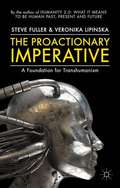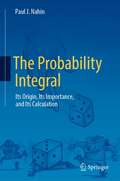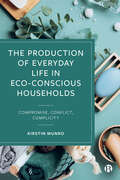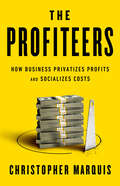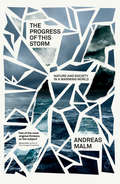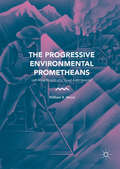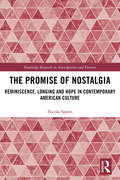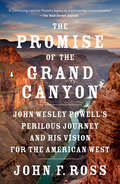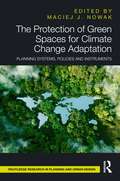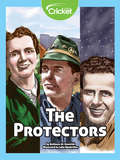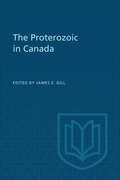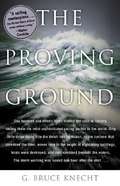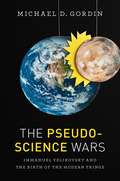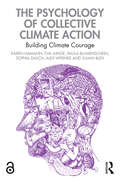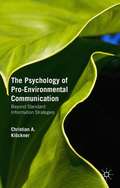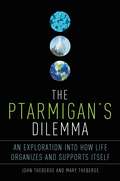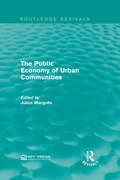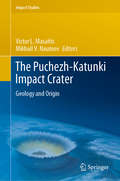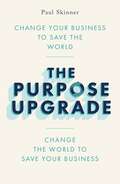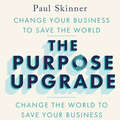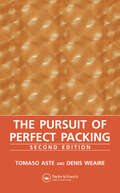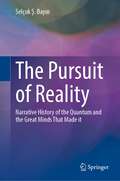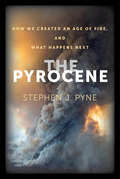- Table View
- List View
The Proactionary Imperative
by Steve FullerThe Proactionary Imperative debates the concept of transforming human nature, including such thorny topics as humanity's privilege as a species, our capacity to 'play God', the idea that we might treat our genes as a capital investment, eugenics and what it might mean to be 'human' in the context of risky scientific and technological interventions.
The Probability Integral: Its Origin, Its Importance, and Its Calculation
by Paul J. NahinThis book tells the story of the probability integral, the approaches to analyzing it throughout history, and the many areas of science where it arises. The so-called probability integral, the integral over the real line of a Gaussian function, occurs ubiquitously in mathematics, physics, engineering and probability theory. Stubbornly resistant to the undergraduate toolkit for handling integrals, calculating its value and investigating its properties occupied such mathematical luminaries as De Moivre, Laplace, Poisson, and Liouville. This book introduces the probability integral, puts it into a historical context, and describes the different approaches throughout history to evaluate and analyze it. The author also takes entertaining diversions into areas of math, science, and engineering where the probability integral arises: as well as being indispensable to probability theory and statistics, it also shows up naturally in thermodynamics and signal processing. Designed to be accessible to anyone at the undergraduate level and above, this book will appeal to anyone interested in integration techniques, as well as historians of math, science, and statistics.
The Production of Everyday Life in Eco-Conscious Households: Compromise, Conflict, Complicity
by Kirstin MunroBased on qualitative interviews with sustainability-oriented parents of young children, this book describes what happens when people make interventions into mundane and easy-to-overlook aspects of everyday life to bring the way they get things done into alignment with their environmental values. Because the ability to make changes is constrained by their culture and capitalist society, there are negative consequences and trade-offs involved in these household-level sustainability practices. The households described in this book shed light on the full extent of the trade-offs involved in promoting sustainability at the household level as a solution to environmental problems.
The Profiteers: How Business Privatizes Profits and Socializes Costs
by Christopher MarquisAn exposé of how society pays for corporations' "free lunch" and the cost of environmental damage, low wages, systemic discrimination, and cheap goods. In an age when business leaders solemnly profess dedication to principles of environmental and social justice, Christopher Marquis&’s provocative investigation into the real costs of doing business reveals the way that leaders of the corporate world gaslight to evade responsibilities by privatizing profits and socializing costs. &“Who pays?&” for the resulting climate and environmental damage, racism, low wages, and cheap goods: the average citizen and the taxpayer. By bringing to light ideas that today are on the fringe but rapidly making their way into the mainstream, Marquis outlines a new regenerative paradigm for business in society. He tells of a group of pioneers trying to not just reform but transform the way business is conducted all over the world. By taking novel actions to reimagine business operations in responsible ways, minimize their negative impacts, and create new ways for business to properly absorb their hidden costs, these leaders provide blueprints to move the needle on vexing social and environmental issues. What&’s in it for leaders of the corporate world? The model of reform presented provides clear guidance on how to get ahead of the curve as an emerging economic order is formed. No business can lead from the front if it is morally-backward looking. History has shown time and again that those who get out in front of emerging changes in our social and environmental landscape protect themselves from inevitable eclipse.
The Progress of This Storm: Nature and Society in a Warming World
by Andreas MalmAn attack on the idea that nature and society are impossible to distinguish from each otherIn a world careening towards climate chaos, nature is dead. It can no longer be separated from society. Everything is a blur of hybrids, where humans possess no exceptional agency to set them apart from dead matter. But is it really so? In this blistering polemic and theoretical manifesto, Andreas Malm develops a counterargument: in a warming world, nature comes roaring back, and it is more important than ever to distinguish between the natural and the social. Only with a unique agency attributed to humans can resistance become conceivable.
The Progressive Environmental Prometheans
by William B. MeyerThis book is devoted to the exploration of environmental Prometheanism, the belief that human beings can and should master nature and remake it for the better. Meyer considers, among others, the question of why Prometheanism today is usually found on the political right while environmentalism is on the left. Chapters examine the works of leading Promethean thinkers of nineteenth and early and mid-twentieth century Britain, France, America, and Russia and how they tied their beliefs about the earth to a progressive, left-wing politics. Meyer reconstructs the logic of this "progressive Prometheanism" and the reasons it has vanished from the intellectual scene today. The Progressive Environmental Prometheans broadens the reader's understanding of the history of the ideas behind Prometheanism. This book appeals to anyone with an interest in environmental politics, environmental history, global history, geography and Anthropocene studies.
The Promise of Nostalgia: Reminiscence, Longing and Hope in Contemporary American Culture (Routledge Research in Anticipation and Futures)
by Nicola SayersThe Promise of Nostalgia analyses a range of texts – including The Virgin Suicides, both the novel by Jeffrey Eugenides’ and Sofia Coppola’s screen adaptation, photography of Detroit’s ‘abandoned spaces’, and blogger Tavi Gevinson's media output – to explore nostalgia as a prominent affect in contemporary American cultural production. Counter to the prevalent caricature of nostalgia as anti-future, the book proposes a more nuanced reading of its stakes and meanings. Instead of understanding it as evidence of the absence of utopia it contends that there is a masked utopian impulse in this nostalgia ‘mode’ and critical potential in what has typically been dismissed as ideological. This book will be of interest to scholars, graduate students and upper-level undergraduate students interested in contemporary culture, cultural theory, media studies, the Frankfurt School, utopian studies and American literature and culture.
The Promise of the Grand Canyon: John Wesley Powell's Perilous Journey and His Vision for the American West
by John F. RossA timely, thrilling account of a man who, as an explorer, dared to lead the first successful expedition down the Colorado through the Grand Canyon--and, as an American visionary, waged a bitterly-contested campaign for environmental sustainability in the American West.When John Wesley Powell became the first person to navigate the entire Colorado River, through the Grand Canyon, he completed what Lewis and Clark had begun nearly 70 years earlier--the final exploration of continental America. The son of an abolitionist preacher, a Civil War hero (who lost an arm at Shiloh), and a passionate naturalist and geologist, in 1869 Powell tackled the vast and dangerous gorge carved by the Colorado River and known today (thanks to Powell) as the Grand Canyon. With The Promise of the Grand Canyon, John Ross recreates Powell's expedition in all its glory and terror, but his second (unheralded) career as a scientist, bureaucrat, and land-management pioneer concerns us today. Powell was the first to ask: how should the development of the west be shaped? How much could the land support? What was the role of the government and private industry in all of this? He began a national conversation about sustainable development when most everyone else still looked upon land as an inexhaustible resource. Though he supported irrigation and dams, his prescient warnings forecast the 1930s dustbowl and the growing water scarcities of today. Practical, yet visionary, Powell didn't have all the answers, but was first to ask the right questions.
The Protection of Green Spaces for Climate Change Adaptation: Planning Systems, Policies and Instruments (Routledge Research in Planning and Urban Design)
by Maciej J. NowakThe Protection of Green Spaces for Climate Change Adaptation identifies how spatial planning and climate change adaptation are linked by examining the protection of green spaces in cities across Europe, Africa, the Middle East, South America and Australia.This book identifies how, in each case, spatial planning instruments can influence the protection of green spaces, and whether – and if so how – they are being adapted in response to actual and expected effects from climate change. In doing so, the institutional frameworks of each country analysed are first presented. This provides the basis for discussing the key problems occurring at the state (and city) level in responding to the challenges of climate change adaptation, especially for the protection of green spaces. In the individual chapters, the issues identified above will be analysed from the perspective of diverse countries: Australia, Ghana, Iran, Mexico, Brazil and Poland. The contributors in this edited collection will present how the indicated issue is identified in systems that are diverse in many respects. This book concludes by demonstrating how the relationship between climate change adaptation and spatial planning can be framed in a more universal way, taking into account the international case studies that have been presented. This book deals extensively with both climate change adaptation issues and comparisons of spatial planning systems.By focusing on a synthesis of these issues, this book will add significantly to the discussion, providing a new basis for theoretical and practical considerations. It will be of interest to researchers and students of spatial planning, public policy, environmental protection, climate protection and law, as well as professionals working in these areas.
The Protectors
by Kathiann M. KowalskiIt takes commitment to overcome interests that stand in the way of protecting the environment. Meet three people who weren't afraid to speak up to protect natural areas—and us.
The Proterozoic in Canada (The Royal Society of Canada Special Publications #2)
by James E. GillProterozoic time produced much of great interest to geologists, and was of tremendous economic import to the people of Canada and the United States. Most of the iron deposits of the Lake Superior district, the Michigan copper deposits, the enormously important Sudbury nickel-copper-platinum deposits, the spectacular silver deposits of the Cobalt district, and all of the important uranium ores in the Shield area are considered to have formed during this period in geological time. Proterozoic rock groups include those Precambrian rocks which are least deformed and metamorphosed. Because of their important economic deposits, they have been examined in great detail in certain localities. The results of such examination, and of others which were for reconnaissance only, are summarized in this volume of the Royal Society of Canada. Suggestions are made for revision of previous interpretations of Precambrian history, and the terminology which grew out of them. Three papers deal with problems arising from the current use of the term Proterozoic, and with possible changes in its use to bring it more into accord with the facts. Contributors to this volume are: E.M. Abraham, Robert Bergeron, R.G. Blackadar, I.C. Brown, G.H. Charleswood, J.F. Davies, K.E. Eade, W.F. Fahrig, R.M. Farquhar, James E. Gill, H.C. Gunning, J.M. Harrison, D.F. Hewitt, W.W. Moorhouse, J.E. Reesor, S.M. Roscoe, R.D. Russell, James E. Thomson, Robert Thomson, L.J. Weeks, Alice E. Wilson, J.T. Wilson, G.M. Wright.
The Proving Ground: The Inside Story of the 1998 Sydney to Hobart Race
by G. Bruce KnechtThe story of one of the worst disasters in modern yachting history. 115 boats that started under clear skies in Sydney, just 43 would finish...after the fleet had been ripped apart by unforecast winds and 80-foot-high waves.
The Pseudoscience Wars: Immanuel Velikovsky and the Birth of the Modern Fringe
by Michael D. GordinProperly analyzed, the collective mythological and religious writings of humanity reveal that around 1500 BC, a comet swept perilously close to Earth, triggering widespread natural disasters and threatening the destruction of all life before settling into solar orbit as Venus, our nearest planetary neighbor. Sound implausible? Well, from 1950 until the late 1970s, a huge number of people begged to differ, as they devoured Immanuel Velikovsky’s major best-seller, Worlds in Collision, insisting that perhaps this polymathic thinker held the key to a new science and a new history. Scientists, on the other hand, assaulted Velikovsky’s book, his followers, and his press mercilessly from the get-go. In The Pseudoscience Wars, Michael D. Gordin resurrects the largely forgotten figure of Velikovsky and uses his strange career and surprisingly influential writings to explore the changing definitions of the line that separates legitimate scientific inquiry from what is deemed bunk, and to show how vital this question remains to us today. Drawing on a wealth of previously unpublished material from Velikovsky’s personal archives, Gordin presents a behind-the-scenes history of the writer’s career, from his initial burst of success through his growing influence on the counterculture, heated public battles with such luminaries as Carl Sagan, and eventual eclipse. Along the way, he offers fascinating glimpses into the histories and effects of other fringe doctrines, including creationism, Lysenkoism, parapsychology, and more—all of which have surprising connections to Velikovsky’s theories. Science today is hardly universally secure, and scientists seem themselves beset by critics, denialists, and those they label “pseudoscientists”—as seen all too clearly in battles over evolution and climate change. The Pseudoscience Wars simultaneously reveals the surprising Cold War roots of our contemporary dilemma and points readers to a different approach to drawing the line between knowledge and nonsense.
The Psychology of Collective Climate Action: Building Climate Courage
by Karen Hamann Eva Junge Paula Blumenschein Sophia Dasch Alex Wernke Julian BlehHow do we find the courage to act together against the climate crisis? This book weaves together real-life findings and examples from the socio-ecological movement with psychological research to show how motivation for collective climate action can be built.The book addresses two key questions: how can individuals be motivated to participate in collective climate action, and how can climate groups become resilient and effective? Specifically, it explores how individuals can foster their identification with climate action groups and the belief in their joint efficacy. It touches on a wide range of topics, covering anger, moral considerations, activist burnout, and the perception of protests, as well as general theories of socio-ecological change.This book is for anyone who is seeking the courage to act together and is curious about psychological insights. It will be essential reading for climate and environmental practitioners, climate activists and campaigners, climate change communicators, and anyone involved in socio-ecological change. It will also be of interest to students and researchers in the fields of environmental psychology, climate change, collective action, and political psychology.The Open Access version of this book, available at http://www.taylorfrancis.com, has been made available under a Creative Commons (CC BY) 4.0 license.
The Psychology of Pro-Environmental Communication: Beyond Standard Information Strategies
by Christian A. KlöcknerThe environment is part of everyone's life but there are difficulties in communicating complex environmental problems, such as climate change, to a lay audience. In this book Klöckner defines environmental communication, providing a comprehensive and up-to-date analysis of the issues involved in encouraging pro-environmental behaviour.
The Ptarmigan's Dilemma: An Ecological Exploration into the Mysteries of Life
by Mary Theberge John ThebergeDrawing on breakthrough research in evolution, genetics, and on their extensive work in the field and lab, wildlife biologists John and Mary Theberge explain for non-scientists the real facts of life. Birds that suddenly grow gall bladders, when their species has none. Moose with antlers so big they encumber their movement through the forest. Butterflies that risk extinction by overwintering en masse. These are just a few stories the Theberges tell in their examination of what the mechanisms of evolution are and how they work. With examples from the very latest discoveries in genetics and ones they have made in their own field work, The Ptarmigan's Dilemma is a ground-breaking explanation of evolution for non-scientists. By marrying the separate sciences of ecology and genetics, the Theberges paint a picture far richer than either discipline can alone of how, for almost 4 billion years, life on Earth has evolved into the rich diversity that's under threat today. Along the way, they explain just what "the survival of the fittest" really means, how dramatic evolutionary changes can take place in just one generation, and how our too-little knowledge of or interest in how life on Earth organizes and supports itself is rapidly making us a danger to ourselves.
The Public Economy of Urban Communities: Papers Presented At The 2nd Conference On Urban Public Expenditures, Feb. 21-22, 1964 (Routledge Revivals)
by Julius MargolisOriginally published in 1965, Margolis brings together a wide variety of papers on a multitude of subjects relating to the urban public economy presented at the second conference on urban public expenditures in 1964. This collection covers issues such as criteria for decision-making in urban public spending, public and private supply and the political and voting behaviour of urban economies in order to contribute to the development of new analytical models and techniques as well as to disseminate findings of research results to a larger audience. This title will be of interest to those studying Environmental studies and Economics as well as professionals.
The Puchezh-Katunki Impact Crater: Geology and Origin (Impact Studies)
by Victor L. Masaitis Mikhail V. NaumovThis book presents essential data on the geology of the Puchezh-Katunki crater – an early Jurassic crater located on the East European Platform, with an impact structure that is ca. 80 km in diameter. Offering a comprehensive guide, it reviews the studies carried out during the last several decades on this prominent but not well-known impact structure. It offers the international community state-of-the-art information on the crater with regard to e.g. structural mapping, drilling (including the Vorotilovo well, which is 5374 m deep), geophysical research, and the petrological analysis of impactites and various breccias. In addition, the book includes new results from the mineralization and crystallizations beneath this large impact crater, and suggests new models for crater formations.
The Purpose Upgrade: Change Your Business to Save the World. Change the World to Save Your Business
by Paul SkinnerUnlock greater profits. Empower happier and more engaged staff. Foster loyalty and connection with customers. Save your business... and the world. How? It all starts with a Purpose Upgrade.History shows that hard times can lead to the greatest opportunities for renewal. The Purpose Upgrade will support readers in leading enterprises that thrive by solving our most important problems.It shows how businesses can create more compelling benefits for customers, build meaningful livelihoods for colleagues, and unlock superior returns for investors by 'repurposing' and revitalising the activities they engage in.Meet the social entrepreneur who repurposed the previously 'boring' trade in office supplies to fund micro-finance initiatives that reach millions of the people most exposed to poverty, so that 'even a bad day at the office saves lives'.Learn how the leaders of a coal-mining business repurposed their enterprise first as an industrial chemicals company and then more spectacularly as a sustainable living business, generating unprecedented shareholder returns by aligning their objectives with the United Nations Sustainable Development Goals. They are now changing the lives of smallholder farmers, re-directing the food system to a more sustainable model, and harnessing the power of the world's biggest brands to provide more nutritious food on a healthier planet. And, most importantly, discover a unique methodology that you can use to make a Purpose Upgrade an always-available event at any level of your own enterprise.There has never been a more urgent need to change our businesses to save the world or a more opportune time to change the world to save our businesses.
The Purpose Upgrade: Change Your Business to Save the World. Change the World to Save Your Business
by Paul SkinnerUnlock greater profits. Empower happier and more engaged staff. Foster loyalty and connection with customers. Save your business... and the world. How? It all starts with a Purpose Upgrade.History shows that hard times can lead to the greatest opportunities for renewal. The Purpose Upgrade will support readers in leading enterprises that thrive by solving our most important problems.It shows how businesses can create more compelling benefits for customers, build meaningful livelihoods for colleagues, and unlock superior returns for investors by 'repurposing' and revitalising the activities they engage in.Meet the social entrepreneur who repurposed the previously 'boring' trade in office supplies to fund micro-finance initiatives that reach millions of the people most exposed to poverty, so that 'even a bad day at the office saves lives'.Learn how the leaders of a coal-mining business repurposed their enterprise first as an industrial chemicals company and then more spectacularly as a sustainable living business, generating unprecedented shareholder returns by aligning their objectives with the United Nations Sustainable Development Goals. They are now changing the lives of smallholder farmers, re-directing the food system to a more sustainable model, and harnessing the power of the world's biggest brands to provide more nutritious food on a healthier planet. And, most importantly, discover a unique methodology that you can use to make a Purpose Upgrade an always-available event at any level of your own enterprise.There has never been a more urgent need to change our businesses to save the world or a more opportune time to change the world to save our businesses.
The Purpose Upgrade: Change Your Business to Save the World. Change the World to Save Your Business
by Paul SkinnerUnlock greater profits. Empower happier and more engaged staff. Foster loyalty and connection with customers. Save your business... and the world. How? It all starts with a Purpose Upgrade.History shows that hard times can lead to the greatest opportunities for renewal. The Purpose Upgrade will support readers in leading enterprises that thrive by solving our most important problems.It shows how businesses can create more compelling benefits for customers, build meaningful livelihoods for colleagues, and unlock superior returns for investors by 'repurposing' and revitalising the activities they engage in.Meet the social entrepreneur who repurposed the previously 'boring' trade in office supplies to fund micro-finance initiatives that reach millions of the people most exposed to poverty, so that 'even a bad day at the office saves lives'.Learn how the leaders of a coal-mining business repurposed their enterprise first as an industrial chemicals company and then more spectacularly as a sustainable living business, generating unprecedented shareholder returns by aligning their objectives with the United Nations Sustainable Development Goals. They are now changing the lives of smallholder farmers, re-directing the food system to a more sustainable model, and harnessing the power of the world's biggest brands to provide more nutritious food on a healthier planet. And, most importantly, discover a unique methodology that you can use to make a Purpose Upgrade an always-available event at any level of your own enterprise.There has never been a more urgent need to change our businesses to save the world or a more opportune time to change the world to save our businesses.
The Pursuit of Perfect Packing
by Tomaso Aste Denis WeaireCoauthored by one of the creators of the most efficient space packing solution, the Weaire-Phelan structure, The Pursuit of Perfect Packing, Second Edition explores a problem of importance in physics, mathematics, chemistry, biology, and engineering: the packing of structures. Maintaining its mathematical core, this edition continues and rev
The Pursuit of Reality: Narrative History of the Quantum and the Great Minds That Made it
by Selçuk Ş. BayınIn a highly accessible style, this book presents a narrative history of the quantum theory with the new developments that intrigue all inquisitive minds. Quantum theory is counter-intuitive and sometimes downright weird. Even Nobel Laureate physicists like Richard Feynman admit that they do not understand it. Yet, so far, there is not a shred of experimental data that conflicts with its predictions. Its effect on our lives is bound to increase with the quantum information era ushered in by the great Bohr–Einstein debate. Tantalizing applications of quantum information like teleportation, spy-proof communication, super-fast quantum computers, and more are going to influence our lives and change our beliefs about the nature of physical reality. This book takes the reader on an exhilarating journey through the intellectual history of quantum that is turning out to be more surprising every day.
The Puzzle of Pangaea
by Meg MossDeep underground, unseen forces are at play to move the continents around our globe.
The Pyrocene: How We Created an Age of Fire, and What Happens Next
by Stephen J. PyneA dramatic reorientation of humanity’s relationship with fireThe Pyrocene tells the story of what happened when a fire-wielding species, humanity, met an especially fire-receptive time in Earth's history. Since terrestrial life first appeared, flames have flourished. Over the past two million years, however, one genus gained the ability to manipulate fire, swiftly remaking both itself and eventually the world. We developed small guts and big heads by cooking food; we climbed the food chain by cooking landscapes; and now we have become a geologic force by cooking the planet. Some fire uses have been direct: fire applied to convert living landscapes into hunting grounds, forage fields, farms, and pastures. Others have been indirect, through pyrotechnologies that expanded humanity's reach beyond flame's grasp. Still, preindustrial and Indigenous societies largely operated within broad ecological constraints that determined how, and when, living landscapes could be burned. These ancient relationships between humans and fire broke down when people began to burn fossil biomass—lithic landscapes—and humanity’s firepower became unbounded. Fire-catalyzed climate change globalized the impacts into a new geologic epoch. The Pleistocene yielded to the Pyrocene. Around fires, across millennia, we have told stories that explained the world and negotiated our place within it. The Pyrocene continues that tradition, describing how we have remade the Earth and how we might recover our responsibilities as keepers of the planetary flame.
